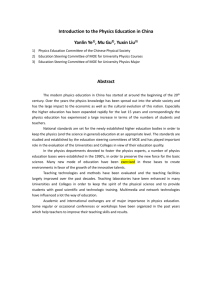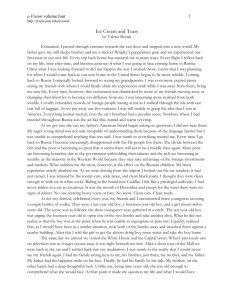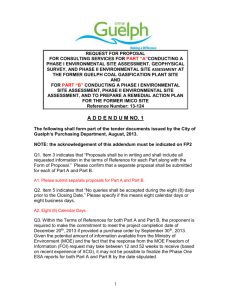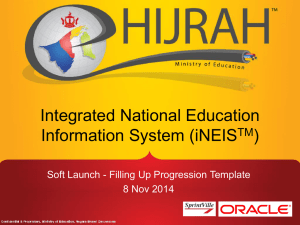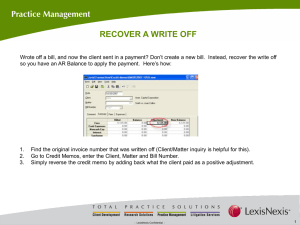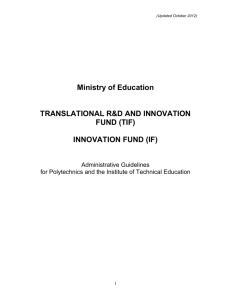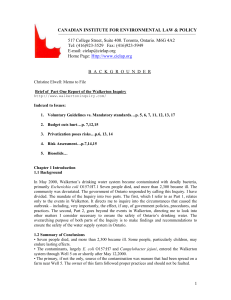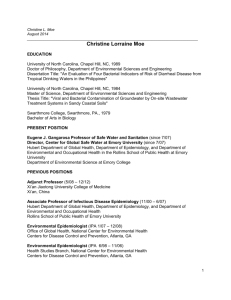Cox - James Madison University
advertisement
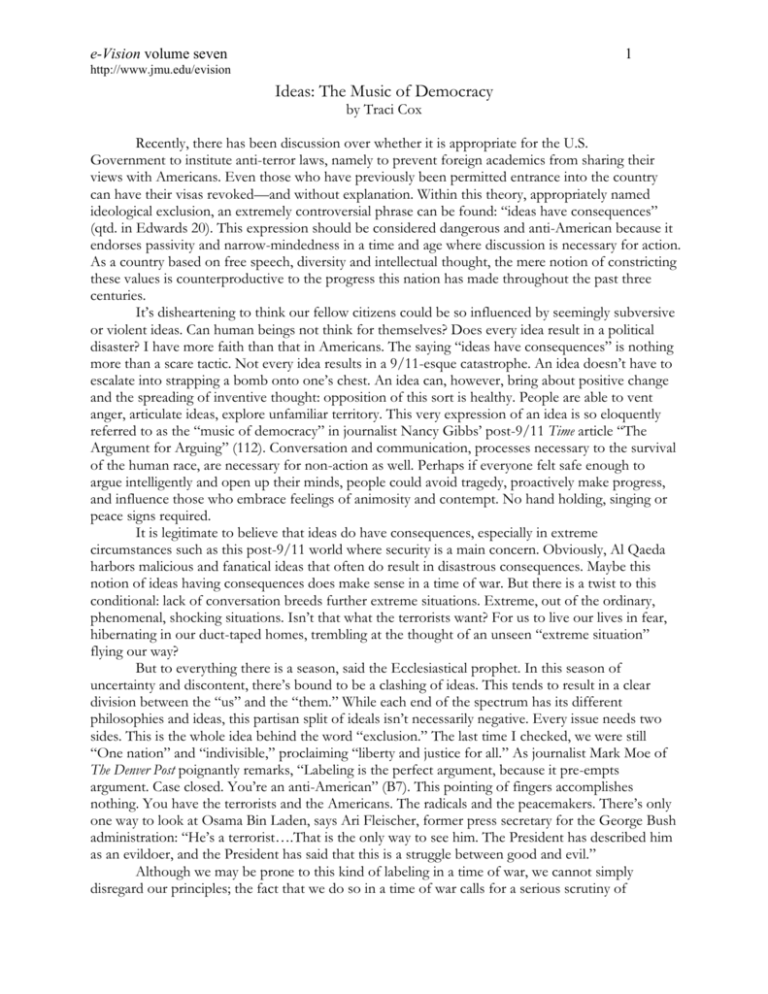
e-Vision volume seven 1 http://www.jmu.edu/evision Ideas: The Music of Democracy by Traci Cox Recently, there has been discussion over whether it is appropriate for the U.S. Government to institute anti-terror laws, namely to prevent foreign academics from sharing their views with Americans. Even those who have previously been permitted entrance into the country can have their visas revoked—and without explanation. Within this theory, appropriately named ideological exclusion, an extremely controversial phrase can be found: “ideas have consequences” (qtd. in Edwards 20). This expression should be considered dangerous and anti-American because it endorses passivity and narrow-mindedness in a time and age where discussion is necessary for action. As a country based on free speech, diversity and intellectual thought, the mere notion of constricting these values is counterproductive to the progress this nation has made throughout the past three centuries. It’s disheartening to think our fellow citizens could be so influenced by seemingly subversive or violent ideas. Can human beings not think for themselves? Does every idea result in a political disaster? I have more faith than that in Americans. The saying “ideas have consequences” is nothing more than a scare tactic. Not every idea results in a 9/11-esque catastrophe. An idea doesn’t have to escalate into strapping a bomb onto one’s chest. An idea can, however, bring about positive change and the spreading of inventive thought: opposition of this sort is healthy. People are able to vent anger, articulate ideas, explore unfamiliar territory. This very expression of an idea is so eloquently referred to as the “music of democracy” in journalist Nancy Gibbs’ post-9/11 Time article “The Argument for Arguing” (112). Conversation and communication, processes necessary to the survival of the human race, are necessary for non-action as well. Perhaps if everyone felt safe enough to argue intelligently and open up their minds, people could avoid tragedy, proactively make progress, and influence those who embrace feelings of animosity and contempt. No hand holding, singing or peace signs required. It is legitimate to believe that ideas do have consequences, especially in extreme circumstances such as this post-9/11 world where security is a main concern. Obviously, Al Qaeda harbors malicious and fanatical ideas that often do result in disastrous consequences. Maybe this notion of ideas having consequences does make sense in a time of war. But there is a twist to this conditional: lack of conversation breeds further extreme situations. Extreme, out of the ordinary, phenomenal, shocking situations. Isn’t that what the terrorists want? For us to live our lives in fear, hibernating in our duct-taped homes, trembling at the thought of an unseen “extreme situation” flying our way? But to everything there is a season, said the Ecclesiastical prophet. In this season of uncertainty and discontent, there’s bound to be a clashing of ideas. This tends to result in a clear division between the “us” and the “them.” While each end of the spectrum has its different philosophies and ideas, this partisan split of ideals isn’t necessarily negative. Every issue needs two sides. This is the whole idea behind the word “exclusion.” The last time I checked, we were still “One nation” and “indivisible,” proclaiming “liberty and justice for all.” As journalist Mark Moe of The Denver Post poignantly remarks, “Labeling is the perfect argument, because it pre-empts argument. Case closed. You’re an anti-American” (B7). This pointing of fingers accomplishes nothing. You have the terrorists and the Americans. The radicals and the peacemakers. There’s only one way to look at Osama Bin Laden, says Ari Fleischer, former press secretary for the George Bush administration: “He’s a terrorist….That is the only way to see him. The President has described him as an evildoer, and the President has said that this is a struggle between good and evil.” Although we may be prone to this kind of labeling in a time of war, we cannot simply disregard our principles; the fact that we do so in a time of war calls for a serious scrutiny of e-Vision volume seven 2 http://www.jmu.edu/evision American patriotism. We proclaim our patriotism on our bumper stickers, with our fireworks, by hanging a flag on our white picket fences. So do we embrace free speech, or does it come with a caveat? What does “America the beautiful” really stand for, anyway? What kind of message are we sending by squelching debate while we are actually residing in “the land of the free”? Truly, in this melting pot of a nation in which we are being constantly stirred, ideas are bound to boil to the surface. As Moe comments in his Denver Post article, “The fact is, dissent gets people talking, issues mulled, wrongs righted. People find out where they really stand and what they really believe in. Is that a bad thing?” (B7). Why should we be offended or appalled when someone brings up a radical or liberal idea of the “other side,” or even insults our leader? As Moe insinuates, ideas are not harmful; they are productive and lead to intelligent debate and inquiry. Should we do what Ari Fleischer suggests when he reminds us that “all Americans need to watch what they say, watch what they do”? If there was no dissent, there would be no politics, no internal discourse, and a severe lack of interesting conversation at the dinner table. Jay Bennish, a high school geography teacher at Overland High School in Colorado, has recently borne the brunt of this free speech debate. In an attempt to “stimulate his students to think critically,” Bennish ranted and raved to his class about Bush’s State of the Union address and likened him to Hitler (“Colo. Teacher” A6). Does he hate America? Probably not. His profession is, after all, one of the most tightly controlled by our government. Was he spreading “dangerous ideas,” promoting “subversive filth,” and attempting to “tarnish our ideals” (Moe B7)? Gasp! What audacity! Maybe he offered up this dramatic monologue in an attempt to rile his students to think for themselves, to question his point of view. While he may have pushed it too hard, he sure pulled a Patrick Henry with the “Give me liberty or let me be fired” speech. The consequence? I’m pretty sure there haven’t been any assassination attempts on Bush by a teenager from the Cherry Creek School district. I have, however, seen the issue printed in prominent newspapers and magazines as well as deliberated in college classrooms, resulting in a passionate examination of beliefs. Who cares if his viewpoint is right or wrong? The point is this: a manual for soul-shaking inquiry can’t be found in a textbook. Ponder the founding of our great nation. We are the most powerful and frightening country in the world. We didn’t evolve into a world power by being idle, cowardly or apprehensive. Our founding fathers questioned the ideals and restrictions that were forced upon them by the English monarchy. A war was fought on our own soil over the worth of the human soul—surely a question that deserved an answer. Thoreau, Walt Whitman and Lincoln, King, Mencken and Upton Sinclair, Fitzgerald, Kerouac, and Ralph Nader all offered voices of radical dissent against mainstream culture (Moe B7). Out of their seemingly “anti-American” rants came some of the best literature and commentaries that can be found in libraries across the world. Out of their unusual and “liberal” ideas came consequences that have aided our nation in immense ways. Yes, turmoil and violence often come with revolution. But without questioning, without the single soul who scoffs and disagrees, we would still believe the earth is flat. René Descartes is famous for his philosophical motto, “I think, therefore I am.” Notice that this statement does not say, “I think, therefore I have consequences.” We are human beings, endowed with the arts of conversation and reasoning. Our nation and our individual personas are based entirely upon the ideas that shape us. Realistically, we will never be able to completely do away with controversial or radical ideas. Should we contradict ourselves, going against the principles that define America? Should we cower in the face of contradiction and embrace passivity? Should we pull a Hitler and simply do away with the “them”? Of course not. Fear and disengagement are never the answer. e-Vision volume seven 3 http://www.jmu.edu/evision Works Cited Burton, Dan. “Anti-American Turn.” Washington Times 10 Feb. 2006: A19. LexisNexis. James Madison U, Carrier Lib., Harrisonburg, VA. 1 April 2006 <http://web.lexisnexis.com/ universe>. “Colo. Teacher Accused of Bias Is Reinstated.” Washington Post 11 Mar. 2006: A6. 14 March 2006 <http://www.washingtonpost.com>. Edwards, James R., Jr. “Keeping Extremists Out: The History of Ideological Exclusion and the Need for Its Revival.” Backgrounder Sept. 2005. Center for Immigration Studies. 14 March 2006 <http://www.cis.org/articles/2005/back1005.pdf >. Fleischer, Ari. Press Briefing. Office of the Press Secretary. The White House. 26 Sept. 2001. 29 March 2006 <http://www.whitehouse.gov/news/releases/2001/09/print/ 200109265.html>. Gibbs, Nancy. “The Argument for Arguing.” Time 15 Oct. 2001: 112. Moe, Mark. “Ugly Anti-American or Voice of Dissent?” Denver Post 8 March 2006: B7. LexisNexis. James Madison U, Carrier Lib., Harrisonburg, VA. 1 April 2006 <http://web.lexisnexis.com/universe>. e-Vision essays copyright © 2007. All rights revert to individual authors. All authors have granted permission for use in instructional purposes only.
